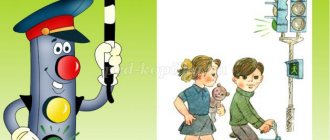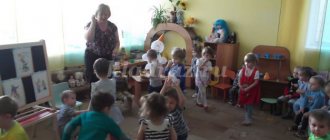Consultation for parents on traffic rules in the nursery group.
MBDOU "Kindergarten No. 9 "Constellation"
Consultation for parents
according to traffic rules in the nursery group.
Prepared by: Datkhuzheva E.K., Chuts F.Ch.
2019
Rules for parents
The child begins to become familiar with the rules of the road
long before entering kindergarten. He receives his first knowledge and experience from
observations of your loved ones, parents. Therefore it is very important that
the parents themselves not only knew, but also adhered to in everyday life
traffic rules. The kindergarten is actively working on
studying traffic rules with children. But only your parents
personal example, assessment of behavior will be able to translate these rules into norms
child's behavior. The recommendations below are considered
Typical traffic situations that need to be constantly monitored
children's attention.
The main danger is a standing car!
A stationary car is dangerous: it can block another
a car that is moving at high speed interferes with time
notice the danger. You cannot go out onto the road because of parked cars. IN
as a last resort, you need to carefully look out from behind a standing car,
make sure that there is no danger and only then cross the road.
Do not go around a stationary bus, either in front or behind!
A stationary bus covers a section of the road along which
the moment you decide to cross it, a car may be passing. Except
In addition, people near the bus stop are usually in a hurry and forget about safety. From
stop, you must move towards the nearest pedestrian crossing.
Know how to anticipate hidden dangers!
Due to a standing car, house, fence, bushes, etc.
a car suddenly leaves. To cross the road you need to choose this
a place where the road is visible in both directions. As a last resort,
you can carefully look out from behind the obstacle, make sure that there is no danger, and
only then cross the road.
The car is approaching slowly, but you still have to let it pass.
A slow moving car may be hiding a car behind it,
going at high speed. The child often does not suspect that behind one
another one may be hidden by the machine.
And at a traffic light you can meet danger.
Today on city roads we are constantly faced with the fact that
car drivers violate traffic rules: they rush
high speed, ignoring traffic lights and crossing signs. That's why
It is not enough to teach children how to navigate when a traffic light is green,
it is necessary to ensure that there is no danger. Children often reason
like this: “The cars are still standing, the drivers see me and will let me through.” They
are wrong.
Children often run across a “deserted” street without looking.
On a street where cars rarely appear, children run out onto the road
without first examining it, they end up under a car. Work out
It’s a child’s habit to always look around before going out on the road.
stop, listen - and only then cross the street.
Article on traffic rules
Article on traffic rules teacher Gryaznova Irina Sergeevna
It is very important in preschool age to develop skills in following the rules of behavior on the street and road. Traffic is making roads increasingly dangerous for children. Of all traffic participants, the most undisciplined are pedestrians. Accidents with children occur on the streets because children either do not know the traffic rules or violate them without realizing the dangerous consequences. Therefore, it is very important to instill in children a sense of responsibility for their behavior on the street and to ensure that compliance with traffic rules becomes a habit for them. And the teacher’s task is to instill in children skills and abilities related to road safety.
We teach children traffic rules from an early age. In kindergarten, a child must learn the basic concepts of road traffic, as well as learn the most important rules of behavior on the road.
Our group has created a “Safety Corner”, where visual and game material on traffic rules is collected. Children play games independently and look at illustrations. We introduce children to fiction on traffic rules: S. Mikhalkov “Uncle Styopa the Policeman”, “Traffic Light”, “Truck”, B. Zakhoder “Chauffeur”, A. Barto “Truck”, etc. We created a folder with riddles about pedestrian crossings, traffic lights, and road signs, which the children take to look at on their own. We conduct didactic games and word games with children: “Light the traffic light”, “We are drivers”, “Guess the sign”. We play outdoor games: “Bus”, “Truck”, “Sparrows and a car”, role-playing games: “Transport”, “I am a driver”. We conduct conversations: Why do we need a traffic light, why do we need road signs, is it possible to play on the road, why can’t we play on the road? Together with the children, we drew “Traffic Light” with cotton swabs in order to reinforce the traffic light signals. We observe moving vehicles while walking.
To instill in our children the skills of correct behavior on the street and road, we need painstaking, everyday explanatory work with the participation of parents. The knowledge acquired by children in kindergarten should be reinforced at home, in the family. In the reception areas we post consultations for parents “We follow traffic rules for adults and children”, “Children’s car seats”, “Laws of streets and roads”, etc. First of all, parents should remember the power of personal example: if mom, dad or grandmother crosses the street in an unauthorized place, does not pay attention to traffic lights, or runs across the road at a close distance from traffic, then the most conscientious work of the teacher will be ineffective. You need to remember, you are not alone on the street! Children follow the example of adults!
Summary of GCD on traffic rules in the early age group
Summary of GCD on traffic rules in the early age group “Magic Lights”
I bring to your attention a summary of direct organized activities on traffic rules in the early age group “Magic Lights”.
This material can be used by teachers in preschool educational institutions. This summary is aimed at strengthening the skills of safe behavior of children on the street, instilling cultural behavior on the road, and studying the Rules of the Road. Goal: 1. Teach children to distinguish colors: red, yellow, green. 2. Introduce children to traffic lights and the rules for safely crossing the road at a pedestrian crossing. Educational task: to instill in children a sense of responsibility, instill cultural behavior on the road. Preliminary work: 1. Looking at illustrations about traffic rules 2. Reading poems and stories about traffic rules 3. Showing a toy traffic light and looking at it, talking about the purpose of the traffic light. 4. Familiarization with the road markings of a pedestrian crossing - “zebra” 5. Role-playing games Material: mugs of three colors (red, yellow, green), a basket, a traffic light toy, a pedestrian crossing sign, multi-colored cardboard steering wheels, four identical strips of white paper - pedestrian crossing, toys: dog and hedgehog.
Progress of the lesson:
The dog comes and brings red, yellow and green mugs in a basket.
The teacher offers to take the children one mug each. Children take one mug and name its color. The teacher asks the children who have red mugs in their hands to come out. Red color - no access!
The teacher asks the children who have yellow mugs in their hands to come out. Yellow - be ready for the journey,
The teacher asks the children who have green mugs in their hands to come out. And the green color - go!
(If the children make a mistake, the dog barks loudly, and the children correct the mistake) The teacher offers to play the game “Cars”. Children take the steering wheels in their hands and drive in a circle in one direction, reading a poem. We're driving, we're driving, we press the pedal.
We switch gears, We look intently into the distance. The windshield wipers clear the drops to the right, to the left. Purity! The wind ruffles my hair. We are drivers anywhere! The color lights up red (the teacher shows a red circle) - the children - the cars stop, the light turns green (the teacher shows a green circle) - the children - the cars drive on, reading the poem.
There is a knock on the door.
A hedgehog comes in, says hello, and tells the children how he was in a hurry to get home to his hedgehogs, but couldn’t cross the road because there were a lot of cars on the road. The hedgehog asks the teacher and the children to teach him how to cross the road correctly. Educator: Guys, let's show the hedgehog how pedestrians behave on the road? Children (in chorus): Yes. The teacher reads a riddle about a pedestrian crossing: The stripes are familiar to everyone. Children know, adults know. Leads to the other side (points to the crossing) Children: pedestrian crossing! (in unison) Let's show the hedgehog how to cross the road at the pedestrian crossing! Game "We are pedestrians." There are children standing at the pedestrian crossing and a hedgehog in the hands of one of the children. Waiting for the traffic light to cross the street. The teacher shows a red traffic light: “Can I cross the road?” Children: No. The teacher shows the green traffic light: “Can I cross the road?” Children: Yes. A hedgehog and children cross the road at a zebra crossing. The game is repeated several times.
After the game, the hedgehog turns to the children: “Thank you, guys! Now I know how to cross the road correctly. And you remember that you can only cross the road with adults at a pedestrian crossing and only when the traffic light is green! Goodbye, guys!" The guys say goodbye to the hedgehog and the dog. The lesson is over.
We recommend watching:
Summary of GCD in the first junior group on traffic rules From the experience of working as a kindergarten teacher. Game for children of primary preschool age Didactic game on traffic rules in an early age group Synopsis of an integrated lesson for an early age group “Sorceress - water”
Similar articles:
Games to develop classification skills for children 2-3 years old
Games for the development of the articulatory apparatus for children 2-3 years old
Games for teaching counting with children 3-4 years old
Didactic tasks for a walk in kindergarten. Junior preschool age
Training children of the younger group in labor activities

